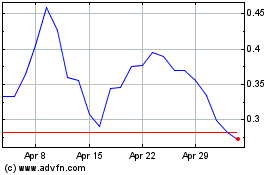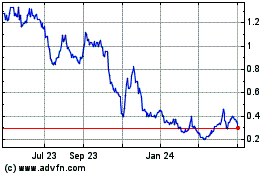Researchers Report That Phenoxodiol Produces Anti-Cancer Responses in Women With Cervical Cancer
November 17 2005 - 12:30PM
PR Newswire (US)
PHILADELPHIA, Nov. 17 /PRNewswire-FirstCall/ -- Researchers from
Yale University's School of Medicine reported today a further
update on results from a clinical study in women with early-stage
cancer of the cervix and vagina. The data were presented today at
the International Conference on Molecular Targets and Cancer
Therapeutics, in Philadelphia, sponsored by the American
Association of Cancer Researchers (AACR), the National Cancer
Institute (NCI), and the European Organization for Research and
Treatment of Cancer (EORTC). The data, presented by Yale
researchers Drs. Masoud Azodi, Peter Schwartz, Michael Kelly,
Thomas Rutherford and Gil Mor, indicates continuing confidence that
the investigational drug phenoxodiol has the potential to change
management options for this highly aggressive gynecological cancer.
The study has so far recruited 16 women with squamous cell
carcinoma of the cervix, vagina or vulva. Phenoxodiol was
administered 8-hourly for 21 to 28 days between their first
diagnosis and surgical resection, the current first line strategy
to manage this disease. To date 14 patients have been evaluated of
whom 6 received 50 mg phenoxodiol per dose and 8 received 200 mg
per dose. The tumor responses were assessed for change in size by
the RECIST method. In the 50 mg dose 5 of 6 patients had stable
disease at the time of surgical resection whereas in the 200 mg
dose group all 8 patients had stable disease at the time of
resection. Analysis of the resected tumor specimens indicated that
the drug was concentrated in tumor tissues in levels which were
greater than the levels in the blood of these patients and further
that the drug was converted to a more active form by deconjugation
within the tumor. The researchers observed that cervical cancer
tissue may contain the necessary deconjugating enzymes
(glucuronidase, sulfatase) that convert the conjugated form of the
drug (the principal form of the drug in the blood) to the
bio-active free form, and that the free form of phenoxodiol then
accumulates in the tumor tissue. This suggests phenoxodiol is
uniquely suited to treatment of this type of cancer. No toxicity
was observed in any patients even in the 200 mg dose stratum,
indicating the high safety profile of the drug. "This response rate
of 92.8 percent in the low dose group and 100 percent in the high
dose group, compared to an expectation of otherwise progressive
disease, represents an outstanding result considering the
relatively short time frame over which phenoxodiol could be
administered in this study," said Professor Graham Kelly,
Phenoxodiol Program Manager for Marshall Edwards, Inc. "The 28-day
period of treatment in this study is a relatively short time to
expect to see a change in tumor progression in these patients,"
Professor Kelly said. "These data with cervical cancer provide
evidence that orally- administered phenoxodiol has a significant
anti-tumor effect, particularly in the case of squamous cell
carcinomas, which are relatively insensitive to standard
anti-cancer drugs." One of the Yale researchers, Dr. Mor, said "We
are confident that these results indicate that phenoxodiol
demonstrates a promising new opportunity in the management of this
serious cancer experienced by many women." The study will continue
to recruit additional patients to enable an evaluation of
phenoxodiol at the higher dose stratum of 400 mg. per dose, and
further studies will be performed on all resected tumor tissues to
measure changes in cell proliferation activity at the microscopic
level. About Phenoxodiol Phenoxodiol is an investigational drug
and, as such, is not marketed in the United States. Phenoxodiol
targets the plasma membrane sphingomyelin pathway, inhibiting the
production of the pro-survival secondary messenger,
sphingosine-1-phosphate (S-1-P), and in turn preventing the
phosphorylation of the Akt signalling cascade and the formation of
anti-apoptotic proteins. Phenoxodiol is highly selective, with no
detectable effect on the sphingomyelin pathway of non-tumor cells,
accounting for the fact that phenoxodiol has no augmenting effect
on the toxic effects of chemotoxic drugs on normal tissues.
Marshall Edwards, Inc., has licensed rights to bring phenoxodiol to
market globally from its parent company, Novogen Limited.
(NASDAQ:NVGN) (ASX:NRT). Novogen is developing a range of
therapeutics across the fields of oncology, cardiovascular disease
and inflammatory diseases based on its phenolic drug technology
platform. More information about phenoxodiol can be found at
http://www.phenoxodiol.com/. About Marshall Edwards, Inc. (MSHL)
Marshall Edwards, Inc., (NASDAQ:MSHL) has licensed rights to bring
phenoxodiol to market globally from its parent company, Novogen
Limited. (NASDAQ:NVGN) (ASX:NRT). Novogen is developing a range of
therapeutics across the fields of oncology, cardiovascular disease
and inflammatory diseases based on its phenolic drug technology
platform. More information on the Novogen group of companies can be
found at http://www.novogen.com/. Under U.S. law, a new drug cannot
be marketed until it has been investigated in clinical trials and
approved by the FDA as being safe and effective for the intended
use. Statements included in this press release that are not
historical in nature are "forward-looking statements" within the
meaning of the "safe harbor" provisions of the Private Securities
Litigation Reform Act of 1995. You should be aware that our actual
results could differ materially from those contained in the
forward-looking statements, which are based on management's current
expectations and are subject to a number of risks and
uncertainties, including, but not limited to, our failure to
successfully commercialize our product candidates; costs and delays
in the development and/or FDA approval, or the failure to obtain
such approval, of our product candidates; uncertainties in clinical
trial results; our inability to maintain or enter into, and the
risks resulting from our dependence upon, collaboration or
contractual arrangements necessary for the development,
manufacture, commercialization, marketing, sales and distribution
of any products; competitive factors; our inability to protect our
patents or proprietary rights and obtain necessary rights to third
party patents and intellectual property to operate our business;
our inability to operate our business without infringing the
patents and proprietary rights of others; general economic
conditions; the failure of any products to gain market acceptance;
our inability to obtain any additional required financing;
technological changes; government regulation; changes in industry
practice; and one-time events. We do not intend to update any of
these factors or to publicly announce the results of any revisions
to these forward-looking statements. DATASOURCE: Marshall Edwards,
Inc. CONTACT: David Sheon, +1-202-518-6384, or Cathy Purcell,
+1-202-285-0370, both for Marshall Edwards, Inc., or Professor
Graham Kelly of Marshall Edwards, Inc., +1-203-247-1322 Web site:
http://www.novogen.com/ http://www.phenoxodiol.com/
Copyright
Kazia Therapeutics (NASDAQ:KZIA)
Historical Stock Chart
From Jun 2024 to Jul 2024

Kazia Therapeutics (NASDAQ:KZIA)
Historical Stock Chart
From Jul 2023 to Jul 2024
